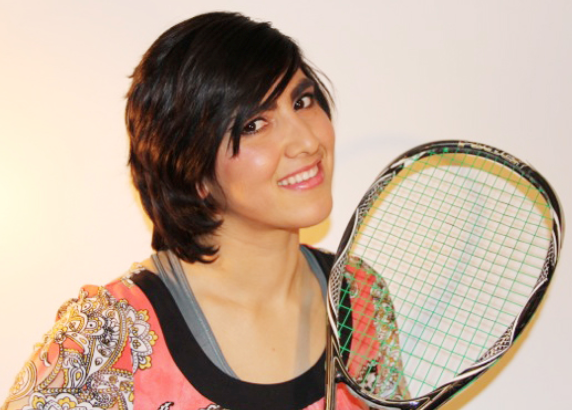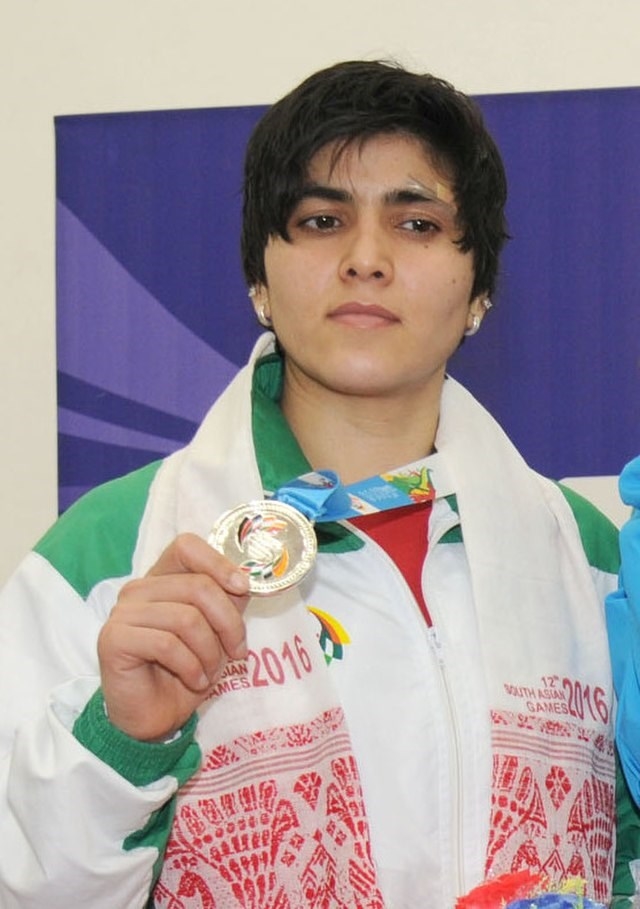"Inequality, injustice and exclusion leads to the waste of immense talent and ideas, reduces human performance and leads to complete chaos and destruction." - Maria Toorpakai
 Maria Toorpakai Wazir Promotional Photo of Maria Toorpakai / Fair use / mariatoorpakai.org
Maria Toorpakai Wazir Promotional Photo of Maria Toorpakai / Fair use / mariatoorpakai.org
Maria Toorpakai Wazir is Pakistani squash player and philanthropist advocating for women, particularly those in Pakistan. Growing up in an area of Pakistan which saw very few girls receive an education or engage in activities such as sport, Toorpakai decided that she was going to be different. She cut her hair, dressed in her brother’s clothes, and gave herself a masculine name, enabling her to pursue her dreams of living freely and becoming a world champion in her sport.
Maria’s Journey
Maria Toorpakai was born on the 22nd of November 1990, in Domel, Bannu. Bannu is a city that sits on the Kurram River in the tribal region of south Khyber Pakhtunkhwa in North Pakistan, on the border to Afghanistan. The area Toorpakai grew up in has been described as “the most dangerous place on earth,”[1] largely due to the activity of extremists including the Taliban and Al-Qaeda. Throughout Toorpakai’s childhood, girls were rarely allowed to leave the house, and if they did, they had to be accompanied by a man. Girls were not permitted to receive an education, play sports, and they were often denied access to adequate healthcare.[2]
Maria Toorpakai was not happy living her life according to these rules. She wanted to play outside and join in with the boys’ football and volleyball games.[3] When she was just four and a half years old, Toorpakai cut her hair short, took all her clothes outside and set them alight, and dressed in her brother’s clothes instead.[4] Thankfully, both of her parents were strong advocates for women’s rights. Toorpakai’s father, Shamsul Qayum Wazir, educated his wife after they married and was committed to providing his daughters with an education also. Shamsul’s sister unexpectedly passed away after collapsing one day, and he believes that she died “of a broken heart because she wasn't allowed to live the life that she wanted to live.”[5] He saw his sister in Maria. So, when Maria decided to disguise herself as a boy, she did so with full support from her parents. Her father even gave Maria her masculine name, Changez Khan, after the warrior Genghis Khan.[6]
By the time she was twelve, Toorpakai was becoming increasingly involved in fights with other boys.[7] In order to channel some of this aggression, Toorpakai’s father took her to try weightlifting in Peshawar and signed her up as a boy under the name Changez Khan. She won her first Pakistan U-16 boys weightlifting championship in Lahore.[8] However, after she saw the boys competing at on the courts behind her weightlifting building, Toorpakai fell in love with squash.[9] Her father took her to a squash academy and tried to enlist her as a boy but had to tell the truth about her gender after the academy’s director asked for her birth certificate. To their surprise, the director was happy to have a girl joining the academy and even gifted Maria her first ever racket that had Jonathon Power’s (a Canadian squash world champion) signature printed on the handle.
However, Toorpakai’s journey to overcoming adversity was far from over. Other players at the academy tormented her relentlessly for being a girl,[10] though she was undeterred. By 2006, Toorpakai had won many junior competitions and just a year later she turned professional. In August 2007, President Pervez Musharraf of Pakistan awarded Maria the Salaam Pakistan Award for her contributions to sport.[11] With the notoriety, however, came the threats. The Taliban threatened Maria and her family if she refused to stop playing squash, particularly in shorts, skirts, and no veil.
Following these threats, and despite the fact she was given security by the Pakistani squash federation, Toorpakai decided the risk was too great and that the safest option for both her and her family would be for her to move and begin training in another country. She reached out to thousands of academies, coaches, and players across the Western world but heard nothing back for three years.[12] During that time, she shut herself away and practiced against the wall of her bedroom for several hours a day.
Though practicing inside was extremely difficult, it was worth it. When former professional squash player and world champion Jonathon Power saw Toorpakai’s email, he reached out and offered her a spot at his training academy in Toronto, Canada.[13] By 2011, she had moved and began her training there. Only a year later, she was Pakistan’s top female squash player.[14] The year after that, she was one of only three Pakistani women ranking in the top 200 squash players in the world.
 Ministry of Youth Affairs and Sports via Wikimedia CommonsMaria Toorpakai Wazir during the presentation ceremony, at the 12th South Asian Games-2016, in Guwahati on February 08, 2016.
Ministry of Youth Affairs and Sports via Wikimedia CommonsMaria Toorpakai Wazir during the presentation ceremony, at the 12th South Asian Games-2016, in Guwahati on February 08, 2016.
In 2017, Toorpakai was assigned a position on the International Olympic Committee's (IOC) Women in Sport Commission to advise the committee in developing their women and sport policy. On being appointed, Toorpakai said:
It's definitely very exciting news for me and for all of us. I can play a better role from this position for athletes and girls in sports.
The Olympics is a stage where the whole world unites and shows their human power. It's our duty to provide all the athletes, male and female, with equal opportunities and a safer and respectable environment. All countries should use humans' potential to its full and it's important for world peace and our economic stability. Inequality, injustice and exclusion leads to the waste of immense talent and ideas, reduces human performance and leads to complete chaos and destruction.[15]
A Different Kind of Daughter and Girl Unbound: The War To Be Her
In 2016, Maria Toorpakai published a detailed account of her journey in her biography A Different Kind of Daughter: The Girl Who Hid from the Taliban in Plain Sight. Watch a short trailer for the book below.
The same year, Erin Heidenreich released her feature-length documentary about Maria Toorpakai’s life, Girl Unbound: The War To Be Her. View the trailer below.
Learn more about the film at https://thewartobeher.com/.
Maria Toorpakai Foundation
In 2013, Maria founded the Maria Toorpakai Foundation (MTF) to promote gender equality and empower girls through sports, particularly in areas where access to education (and by extension sport) is limited, such as Pakistan’s tribal regions. MTF hope that through providing opportunities for education and offering safe spaces for girls to engage in sports, they will also inspire core values such as discipline, respect, and confidence.
The foundation has several initiatives to encourage girls to engage in sport. Their Sports Awareness Campaign, which happens every year in the most conservative areas in Pakistan along the border to Afghanistan, sees Maria and her team travelling to small villages and local schools to tell her story and get girls involved in different sporting activities. Every year, the MTF host a squash clinic for girls in Peshawar in Pakistan. The girls are taught by coaches and volunteers from the foundation, including Maria herself. During the COVID-19 pandemic, Toorpakai hosted virtual fitness sessions through the MTF to women and girls from across the globe.
In the future, Maria Toorpakai and the MTF hope to continue their work through a state-of-the-art sports school for women and girls.
You can learn more about the Toorpakai Sports School plans here.
Learn more about the Maria Toorpakai Foundation here.
Conclusion
After Maria Toorpakai was appointed to the IOC in 2017 Jacques Fontaine, President of the World Squash Federation, said, “Every player has a journey, but very occasionally there is one that is very special and transcends her sport. Maria’s is one of those. She is a most admirable young woman whose experiences will inspire everybody.”[16]
Maria Toorpakai Wazir not only achieved her dreams of being free and becoming a champion in her sport but surpassed them in a tremendous fashion. Not only is she free, but she is also working hard to ensure that women and girls across the globe, no matter where they are from, are able to follow in her footsteps. She is a true hero and continues to champion girls just like her.
[1] Hussain, Zahid. Pakistan's Most Dangerous Place. [Online] Available https://www.wilsonquarterly.com/quarterly/undefined/pakistans-most-dangerous-place. 2012.
[2] TEDx Talks. Squashing Extremism: Maria Toorpakai Wazir at TEDxTeen. [Online] Available https://www.youtube.com/watch?v=fe9DfC8mt14. 2013.
[3] FRESH AIR. To Play Sports Under Taliban Rule, 'Different Kind Of Daughter' Dressed As A Boy. [Online] Available https://www.npr.org/2016/05/04/476742484/to-play-sports-under-taliban-rule-different-kind-of-daughter-dressed-as-a-boy. 2016.
[4] https://mariatoorpakai.org/marias-story
[5] FRESH AIR, 2016.
[6] https://mariatoorpakai.org/marias-story
[7] TEDx Talks, 2016.
[8] https://mariatoorpakai.org/marias-story
[9] TEDx Talks, 2016.
[10] Jinkinson, Bathan. Maria Toorpakai: The Pakistani squash star who had to pretend to be a boy. [Online] Available https://www.bbc.co.uk/news/magazine-21799703. 2013.
[11] Hasan, Taneeya. Unsquashable: Trading volleys with Maria Toor Pakay. [Online] Available https://tribune.com.pk/story/472755/unsquashable-trading-volleys-with-maria-toor-pakay. 2012.
[12] Jinkinson, 2013.
[13] Ibid.
[14] Hasan, 2012.
[15] Squash Info. Pakistan's Toorpakai Appointed to IOC Women in Sport Commission. [Online] Available https://www.squashinfo.com/news.php/6955-pakistans-toorpakai-appointed-to-ioc-women-in-sport-commission. 2017.
[16] World Squash. Pakistan’s Toorpakai Appointed to IOC Women in Sport Commission. [Online] Available https://www.worldsquash.org/pakistans-toorpakai-appointed-to-ioc-women-in-sport-commission/. 2017.
Page created on 10/7/2024 10:28:23 PM
Last edited 3/12/2025 11:52:40 AM
